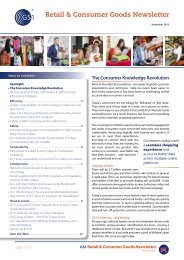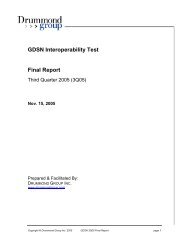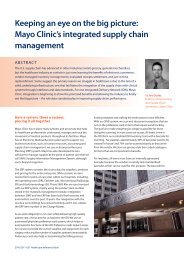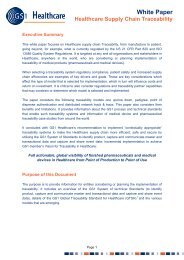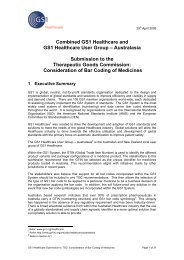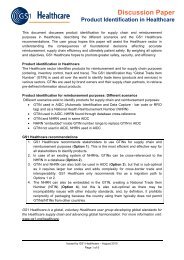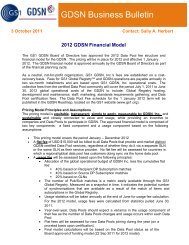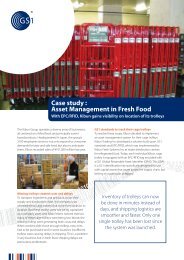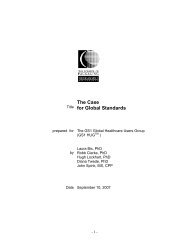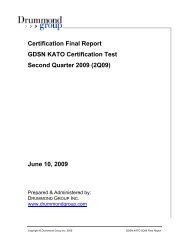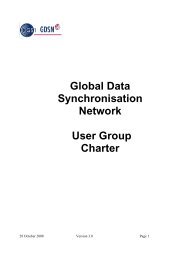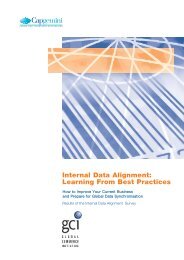Annual Report 2009-2010 - GS1
Annual Report 2009-2010 - GS1
Annual Report 2009-2010 - GS1
Create successful ePaper yourself
Turn your PDF publications into a flip-book with our unique Google optimized e-Paper software.
<strong>GS1</strong> Global Data Synchronisation Network<br />
Sally Herbert<br />
President, <strong>GS1</strong> Standards & System Development<br />
President, <strong>GS1</strong> GDSN Inc.<br />
<strong>GS1</strong> Products & Solutions<br />
Growth and solidity<br />
The Global Data Synchronisation Network, or GDSN, was<br />
launched in August 2004 with 74,000 items registered<br />
in the <strong>GS1</strong> Global Registry. Since that time, adoption,<br />
implementation and growth has increased exponentially<br />
across the world. In fact, in April <strong>2010</strong>, the <strong>GS1</strong> Global<br />
Registry surpassed five million registered items! This<br />
milestone clearly demonstrates sustainable growth of<br />
data synchronisation as a result of increased adoption<br />
and use of the <strong>GS1</strong> Global Data Synchronisation Network<br />
around the world by trading partners across sectors.<br />
Over 23,500 leading companies and organisations across<br />
more than 90 countries have already made the Global<br />
Data Synchronisation Network a cornerstone of their<br />
success, increasing efficiencies and lowering supply chain<br />
costs. More than 20 million messages transited across the<br />
Network from one GDSN-certified data pool to another in<br />
the past year.<br />
“Carrefour has been an active<br />
supporter of GDSN since the<br />
launch about six years ago,<br />
and has gradually expanded its<br />
implementation in France and in<br />
other countries. We are also fully<br />
committed to <strong>GS1</strong>’s data quality<br />
initiative – improving the quality of<br />
data will allow us and our trading<br />
partners to unlock the full<br />
potential of GDSN.”<br />
Ghislain Esquerre<br />
B-to-B Competence Center – Director<br />
Carrefour<br />
Today, the GDSN is a solid and reliable network that allows<br />
its users to take advantage of <strong>GS1</strong> standards to improve<br />
the quality of the information their organisations need to<br />
make mission-critical decisions every day. It is governed<br />
by a neutral body of volunteers from companies in a<br />
variety of industries and sectors. All of the <strong>GS1</strong> standards<br />
that allow it to function are user-defined and user-driven.<br />
Focused on data quality<br />
Data synchronisation programmes cannot function in the<br />
absence of data quality programmes: good quality data<br />
is foundational to collaborative commerce and global<br />
data synchronisation. By improving the quality of data,<br />
trading partners reduce costs, improve productivity and<br />
accelerate speed to market.<br />
However, recent data quality studies carried out in the<br />
United Kingdom (<strong>GS1</strong> UK Data Crunch <strong>Report</strong>) and in<br />
India (<strong>GS1</strong> India Data Quality Audit) clearly show that<br />
inaccurate and incorrect data can be found across the<br />
entire supply chain.<br />
In the Retail and Consumer Packaged Goods sector, for<br />
example, bad data contributes to inefficiencies and<br />
lost sales. Without the GDSN, the multitude of different<br />
methods companies use to share data – spreadsheets,<br />
web portals, emails, paper catalogues – add to the<br />
complexity, redundancy, and promulgation of bad data<br />
and inefficiencies created by ‘work-arounds’ for procedures<br />
which no longer meet business needs. And worse, they<br />
create unnecessary costs. The <strong>GS1</strong> UK Data Crunch <strong>Report</strong><br />
estimated that implementing a data synchronisation<br />
programme would represent a total potential savings in<br />
this sector in the UK of over £700 million over the next<br />
five years: £135 million for retailers and £100 million for<br />
suppliers from eliminating workarounds and corrections,<br />
and an additional potential savings of £250 million and<br />
£225 million for retailers and suppliers respectively for<br />
avoiding shrinkage. Furthermore, the report estimates that<br />
improving data quality could result in an additional £300<br />
million in sales.<br />
Other sectors, such as healthcare, are facing similar<br />
challenges in managing their master data.<br />
28<br />
Read more about GDSN in the healthcare sector, and, in particular, our GDSN Implementation Initiative for Healthcare,<br />
on pages 14-15.



